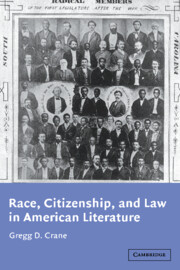Book contents
- Frontmatter
- Contents
- Acknowledgments
- Introduction
- Chapter 1 Higher law in the 1850s
- Chapter 2 The look of higher law: Harriet Beecher Stowe's antislavery fiction
- Chapter 3 Cosmopolitan constitutionalism: Emerson and Douglass
- Chapter 4 The positivist alternative
- Chapter 5 Charles Chesnutt and Moorfield Storey: citizenship and the flux of contract
- Notes
- Index
Chapter 1 - Higher law in the 1850s
Published online by Cambridge University Press: 22 September 2009
- Frontmatter
- Contents
- Acknowledgments
- Introduction
- Chapter 1 Higher law in the 1850s
- Chapter 2 The look of higher law: Harriet Beecher Stowe's antislavery fiction
- Chapter 3 Cosmopolitan constitutionalism: Emerson and Douglass
- Chapter 4 The positivist alternative
- Chapter 5 Charles Chesnutt and Moorfield Storey: citizenship and the flux of contract
- Notes
- Index
Summary
On March 11, 1850, William H. Seward, former Governor of New York and future Secretary of State under Abraham Lincoln, gave his first speech before the Senate. Seward's topic was Henry Clay's proposed omnibus compromise bill, which included admission of California as a free state and a new, more potent Fugitive Slave Law. As oratory, Seward's speech was something of an anticlimax after Daniel Webster's performance in favor of the compromise four days earlier. As the scholarly, bespectacled Seward carefully and undramatically read his speech, the galleries rapidly emptied. Indeed in substance as well as performance, much of Seward's speech was not particularly provocative. Seward complained that, by lumping together very different pieces of legislation, such as the admission of California and the Fugitive Slave Act, Clay's compromise bill prevented separate consideration of each measure on its own merits. Echoing a theme in Webster's March 7 speech, Seward dismissed John Calhoun's anti-compromise argument that California's admission as a free state unfairly disrupted the sectional equilibrium essential to the South's partnership in the Union. The Union was not, Seward contended, a joint venture between independent sections. Given the unexceptional nature of his opening contentions and his colorless performance, many of those leaving the galleries early must have been surprised to learn of the firestorm of criticism ignited by Seward's comments on slavery and the Constitution.
- Type
- Chapter
- Information
- Race, Citizenship, and Law in American Literature , pp. 12 - 55Publisher: Cambridge University PressPrint publication year: 2002
- 1
- Cited by

